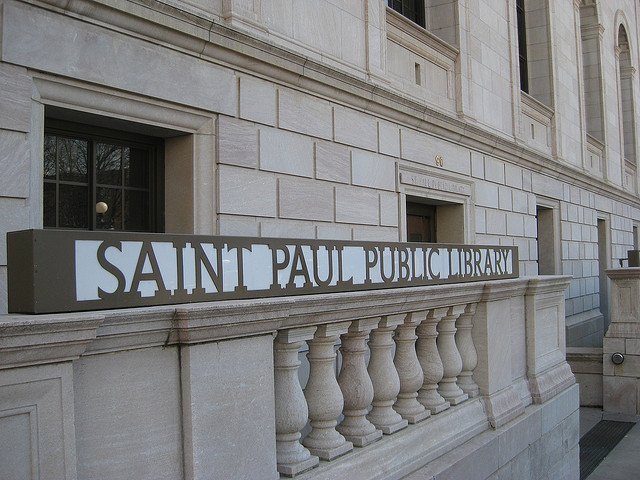
Library curriculum demonstrates civic innovation
Knight Foundation’s Library Initiative supports libraries in 27 cities to become digital community centers that help foster informed and engaged communities. The following blog post, written by Annie Schutte, a librarian, teacher and consultant for Knight, explores a digital skills curriculum established by the St. Paul Public Library. Photo credit: Flickr user Martin Kalfatovic.
The St. Paul Public Library in Minnesota has undergone a transformation over the last few years, rebranding itself as the learning center for its diverse and vibrant community. The Northstar Digital Literacy Standards, which the library developed in collaboration with the St. Paul Community Literacy Consortium, are one of the cornerstones of this vision.
Evidence of this powerful collaboration is visible all across the Twin Cities region.
If you walk into St. Paul’s Rondo Library on a Tuesday evening, you’ll see basic computer classes being taught in Somali through the Mobile WORKplace program.
If you stop by Waite House in the Phillips neighborhood of Minneapolis, you might find a gentleman in the computer lab writing emails to his daughter—something he learned how to do after wandering into the community center for its annual Harvest Feast and hearing about their adult computer classes.
If you’re at a state workforce center, you may find a class of unemployment-insurance recipients working together to bolster their computer skills as part of a new collaboration between the Minnesota Adult Basic Education and the Minnesota Department of Employment and Economic Development. Each of these diverse programs has one major thing in common: the Northstar Digital Literacy Standards.
Northstar’s story begins in 2008, when the financial crisis pushed many Americans out of their jobs and into public libraries and community centers seeking new, 21st-century skills and employment opportunities. The St. Paul Public Library was flooded with patrons who wanted to enroll in computer classes or get help looking for jobs online. Requests for job- and business-related technical assistance went up 34 percent in 2008, and the library offered 420 technology classes that year, but according to Community Services Coordinator Rebecca Ryan, the library soon realized that it wasn’t enough to “know how many people come to the classes; you need to actually know and assess whether and what they’re learning.”
St. Paul Public Library Director Kit Hadley approached the St. Paul Community Literacy Consortium in 2010 to collaborate on establishing curriculum standards for basic digital literacy that would allow sites across the community to better teach and assess these critical skills. This type of strong community partnership is not uncommon in the Twin Cities area, but, Ryan said, “It was the first time they came together to create something this big and far-reaching.”
St. Paul Community Literacy Consortium Chair Tom Cytron-Hysom, who was part of the group that created the Northstar Digital Literacy Standards, describes the process as an almost-yearlong series of open meetings with representatives from the Minnesota Department of Education, the Department of Employment and Economic Development, the St. Paul Public Library, the Minnesota Adult Basic Education Program, and other community nonprofits. The group developed sets of curriculum standards for teaching and learning basic computer skills, the World Wide Web, email, Windows and Microsoft Word, and later added Mac OS X.
The group pushed this work a step further in 2011 by hiring consultants to design and build a set of online modules that would assess students’ progress through the curriculum. The modules went live online in 2012, and since then more than 50,000 people have tested their digital literacy skills on the Northstar website. There are also 80 sponsoring agencies that use the Northstar Digital Literacy Standards—about 45 of which proctor the assessments and can award students a Northstar Digital Literacy Certificate if they earn an 85 percent score or higher on the test. The program has been running for slightly more than a year. Sponsoring, agencies have already awarded about 1,800 Northstar certificates, and five states outside of Minnesota have adopted the Northstar program.
Northstar’s popularity comes in part because of its unique focus on the most basic computer skills. Northstar’s sponsoring agencies primarily target lower-skilled adults, displaced workers and recent immigrants—many of whom have only limited computer access or have never used a computer. Cytron-Hysom explains that the St. Paul working group realized right away that existing assessment programs wouldn’t work for them because “the assessments that are out there are more sophisticated and target a higher level of skills.”
Most patrons who participate in the Northstar programs aren’t seeking jobs where they will regularly use computers. Yet even low-level service professions expect job seekers to look online for employment, and many employers prefer to receive job applications electronically. Wesley Durham, a computer education teacher at Waite House, says that Northstar is useful to students because it “establishes a base from which you can become an independent learner on the computer.”
Northstar has harnessed St. Paul’s library, nonprofit, and business communities to work toward the common goal of providing digital learning opportunities that make sense for the 21st century. The original Northstar working group has morphed into a community advisory board, and those partners are already thinking ahead to how the program can expand and stay relevant in the years to come.
Cytron-Hysom said that the board’s first priority is to ensure that the existing curriculum standards and assessments are updated regularly to reflect constant changes in technology. But the community partners are also looking to potentially add new modules for programs such as Powerpoint and Excel, and additional devices such as mobile phones.
Recent Content
-
Communitiesarticle ·
-
Communitiesarticle ·
-
Communitiesarticle ·


